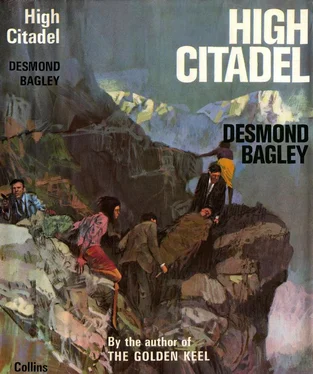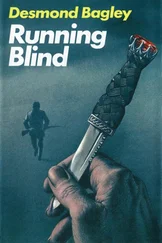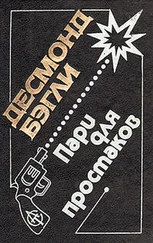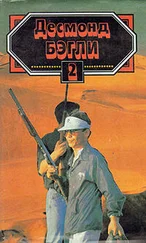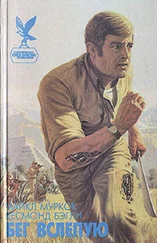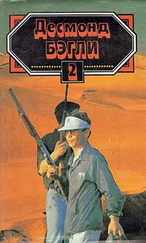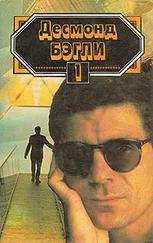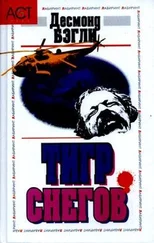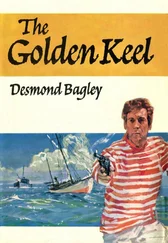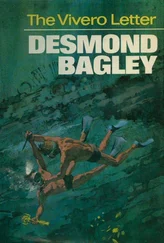It was very quiet on the road, and very lonely. She did not hear a sound except for the occasional splash of a drop of water falling from a rock. It was as though being in the middle of a cloud was like being wrapped in cotton-wool; this was very dirty cotton-wool, but she had done enough flying to know that from above the cloud bank would be clean and shining.
After some time she walked off the road and crossed the rocky hillside until the gigantic cable drum loomed through the mist. She paused by the enormous reel, then went forward to the road cutting and looked down. The road surface was barely visible in the pervading greyness and she stood there uncertainly, wondering what to do. Surely there was something she could be doing.
Fire, she thought suddenly, we can fight them with fire. The drum was already poised to crash into a vehicle coming up the road, and fire would add to the confusion. She hurried back to the camp and collected the bottles of paraffin she had brought back from the bridge, stopping briefly to see how Miss Ponsky was.
Aguillar looked up as she came in. ‘There is soup,’ he said. ‘It will be good in this cold, my dear.’
Benedetta spread her hands gratefully to the warmth of the paraffin heater, and was aware that she was colder than she had thought. ‘I would like some soup,’ she said. She looked over to Miss Ponsky. ‘How are you, Jenny?’
Miss Ponsky, now sitting up, said briskly, ‘Much better, thank you. Wasn’t it silly of me to get shot? I shouldn’t have leaned out so far — and then I missed. And I lost the bow.’
‘I would not worry,’ said Benedetta with a quick smile. ‘Does your shoulder hurt?’
‘Not much,’ said Miss Ponsky. ‘It will be all right if I keep my arm in a sling. Señor Aguillar helped me to make one.’
Benedetta finished her soup quickly and mentioned the bottles, which she had left outside. ‘I must take them up to the road,’ she said.
‘Let me help you,’ said Aguillar.
‘It is too cold out there, tio ,’ she said. ‘Stay with Jenny.’
She took the bottles down to the cable drum and then sat on the edge of the cutting, listening. A wind was rising and the mist swirled in wreaths and coils, thinning and thickening in the vagaries of the breeze. Sometimes she could see as far as the bend in the road, and at other times she could not see the road at all although it was only a few feet below her. And everything was quiet.
She was about to leave, sure that nothing was going to happen, when she heard the faint clatter of a rock from far down the mountain. She felt a moment of apprehension and scrambled to her feet. The others would not be coming unless they were in retreat, and in that case it could just as well be an enemy as a friend. She turned and picked up one of the bottles and felt for matches in her pocket.
It was a long time before she heard anything else and then it was the thud of running feet on the road. The mist had thinned momentarily and she saw a dim figure come round the bend and up the road at a stumbling run. As the figure came closer she saw that it was Willis.
‘What is happening?’ she called.
He looked up, startled to hear a voice from above his head and in a slight panic until he recognized it. He stopped, his chest heaving, and went into a fit of coughing. ‘They’ve come across,’ he gasped. ‘They broke across.’ He coughed again, rackingly. ‘The others are just behind me,’ he said. ‘I heard them running — unless...’
‘You’d better come up here,’ she said.
He looked up at Benedetta, vaguely outlined at the top of the fifteen-foot cutting. ‘I’ll come round by the road,’ he said, and began to move away at a fast walk.
By the time he joined her she had already heard someone else coming up the road, and remembering Willis’s unless , she lay down by the edge and grasped the bottle. It was Armstrong, coming up at a fast clip. ‘Up here,’ she called. ‘To the drum.’
He cast a brief glance upwards but wasted no time in greeting, nor did he slacken his pace. She watched him go until he was lost in the mist and waited for him to join them.
They were both exhausted, having made the five-mile journey uphill in a little over an hour and a half. She let them rest a while and get their breath before she asked them, ‘What happened?’
‘I don’t know,’ said Willis. ‘We were on the trebuchet; we’d let fly when O’Hara told us to — it was ready loaded — and then he yelled for us to clear out, so we took it on the run. There was a devil of a lot of noise going on — a lot of shooting, I mean.’
She looked at Armstrong. He said, ‘That’s about it. I think O’Hara got one of them — I heard a man scream in a choked sort of way. But they came across the bridge; I saw them as I looked back — and I saw O’Hara run into the rocks. He should be along any minute now.’
She sighed with relief.
Willis said, ‘And he’ll have the whole pack of them on his heels. What the hell are we going to do?’ There was a hysterical note in his voice.
Armstrong was calmer. ‘I don’t think so. O’Hara and I talked about this and we came to the conclusion that they’ll play it safe and repair the bridge while they can, and then run jeeps up to the mine before we can get there.’ He looked up at the cable drum. ‘This is all we’ve got to stop them.’
Benedetta held up the bottle. ‘And some of these.’
‘Oh, good,’ said Armstrong approvingly. ‘Those should help.’ He thought a little. ‘There’s not much your uncle can do — or Miss Ponsky. I suggest that they get started for the mine right now — and if they hear anyone or anything coming up the road behind them to duck into the rocks until they’re sure it’s safe. Thank God for this mist.’
Benedetta did not stir and he said, ‘Will you go and tell them?’
She said, ‘I’m staying here. I want to fight.’
‘I’ll go,’ said Willis. He got up and faded into the mist.
Armstrong caught the desperate edge in Benedetta’s voice and patted her hand in a kindly, fatherly manner. ‘We all have to do the best we can,’ he said. ‘Willis is frightened, just as I am, and you are, I’m sure.’ His voice was grimly humorous. ‘O’Hara was talking to me about the situation back at the bridge and I gathered he didn’t think much of Willis. He said he wasn’t a leader — in fact, his exact words were, “He couldn’t lead a troop of boy scouts across a street.” I think he was being a bit hard on poor Willis — but, come to that, I gathered that he didn’t think much of me either, from the tone of his voice.’ He laughed.
‘I’m sure he didn’t mean it,’ said Benedetta. ‘He has been under a strain.’
‘Oh, he was right,’ said Armstrong. ‘I’m no man of action. I’m a man of ideas, just like Willis.’
‘And my uncle,’ said Benedetta. She sat up suddenly. ‘Where is Tim? He should have been here by now.’ She clutched Armstrong’s arm. ‘ Where is he? ’
O’Hara was lying in a crack in the rocks watching a pair of stout boots that stamped not more than two feet from his head, and trying not to cough. Events had been confused just after the rush across the bridge, he had not been able to get to the road — he would have been cut down before going ten yards in the open — so he had taken to the rocks, scuttling like a rabbit for cover.
It was then that he had slipped on a mist-wetted stone and turned his ankle, to come crashing to the ground. He had lain there with all the wind knocked out of him, expecting to feel the thud of bullets that would mean his death, but nothing like that happened. He heard a lot of shouting and knew his analysis of the enemy intentions had proved correct; they were spreading out along the edge of the gorge and covering the approaches to the bridge.
Читать дальше
Конец ознакомительного отрывка
Купить книгу
